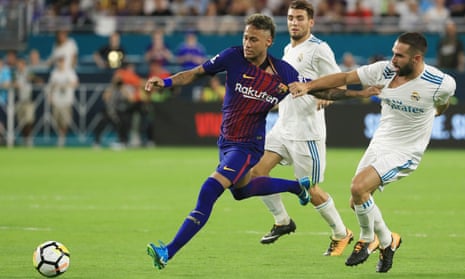Paris Saint-Germain have decided that a single footballer is worth £200m?
Yes, they have. The French club are willing to pay Barcelona a fee greater than the biggest Euromillions jackpot and more than twice as much as the previous world transfer record, set last summer when Paul Pogba joined Manchester United, to buy Neymar from Barcelona. Yes, it is further proof that football is a crazy business but it is also worth noting that this price has not been decided by negotiation. PSG are so desperate to sign the Brazilian forward that they are willing to match the release clause in his contract, a clause traditionally set at a level so high as to be an effective deterrent.
Not for PSG – so they can snap him up?
Not quite so fast. It is fair to say that, while affordable for the club’s Qatari owner, a sum that could buy you a couple of super yachts is likely to take a nasty chunk out of the PSG’s balance sheet and that means the deal is likely to prove contentious under Uefa’s financial fair play rules.
I fear an explanatory bit is coming up ...
FFP was introduced by Uefa seven years ago to stop clubs involved in European competition from spending more than they earn. The basic principle is that, beyond a small loss currently set at €5m over three years, clubs’ outgoings must match their incomings. FFP has been deemed a success in curtailing losses sustained by clubs. But in 2015 it was revised to take into consideration concerns that the system preserved the status quo, with smaller clubs unable to speculate in the hope of success. Since then, as well as exempting any expenditure on infrastructure or youth development, Uefa has also allowed owners to spend an additional €30m of their own money over a rolling three‑year period. Providing there is a business plan that meets with Uefa’s approval, an owner can exceed the total.
What happens if a club are found guilty of an FFP breach?
Uefa has a number of tools at its disposal. When Manchester City were found to have contravened the regulations in 2014, not only were they fined €60m but they were told that instead of naming a squad of 25 players for the Champions League the following season they could name just 21 with eight of those homegrown.
Presumably there is a way around it?
Funny you should mention that. First off, FFP accounting allows for transfer fees to be paid over the length of the player’s contract (just as in the actual deal, payments will be structured over time). So that gives you a bit of wriggle room – PSG might, for example, be able to sell three or four players at €50m a time during the next couple of years. The Spanish press have claimed that the deal could be done in a more roundabout way. Mundo Deportivo has reported that Neymar may have already agreed to become an ambassador for Qatar’s World Cup and that the fee for this might be around £200m. In that case Neymar would be able to turn up at the offices of La Liga and buy out his own release clause.
Well, that would be convenient ...
Yes and it would be highly likely to raise the ire of Uefa. PSG have been the recipient of heavy sanctions under FFP rules after a sponsorship deal, arranged with Qatar’s tourist body, was deemed to have been of insufficient value to match the £167m PSG received for it. Paying Neymar £200m for a few photo opportunities might be considered similarly overpriced. But in this case, the club would not directly be involved.
What happens next?
Let’s assume the deal goes ahead (La Liga has made noises about blocking the deal under FFP but it does not have the jurisdiction to do so). Either a complaint can be made by Barcelona or Uefa can choose to investigate directly if it thinks FFP will be contravened. The decision to do so would begin a long and protracted process that will involve Uefa’s Club Financial Control Body and a substantial number of lawyers.
Meanwhile, Neymar plays on?
Indeed. Though it should perhaps be kept at the back of PSG’s mind that Uefa cannot only fine a club but also ban them from European competition. Precisely the type of embarrassment that PSG, and the embattled state of Qatar, would want to avoid.
